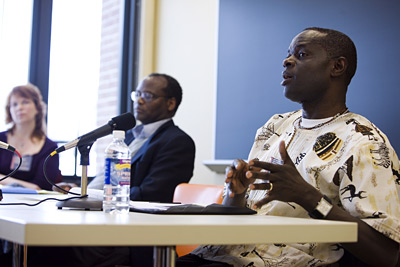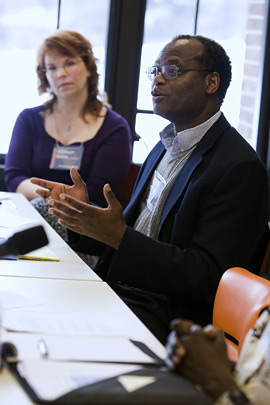Ethnic co-existence in Kenya is critical for harmony, say panelists in forum on understanding tribal warfare
By Sandra Holley

Cornell's Heal Kenya campaign to raise money for the Kenya Red Cross so far has raised more than $4,500.
The effort is intended to help the roughly 300,000 Kenyans who fled their homes after the most fiercely contested presidential election in the nation's history on Dec. 28 led to hundreds of tribal killings.
"You have to realize that ethnicity is reality, and that people are attached to ethnicity," said Cornell Law School Professor Muna Ndulo, director the Cornell Institute for African Development, at a March 28 forum on understanding the current situation in Kenya. The meeting was organized by the Wananchi Association (Cornell's Kenyan and East African student association) in conjunction with the 2008 New York African Studies Association (NYASA) annual conference and the Heal Kenya campaign at Cornell's Africana Studies and Research Center.
The roots of the current crisis in Kenya go deeper than the disputed election, in which the incumbent president was declared the winner over the top opposition leader, despite widespread evidence of vote rigging, forum panelists noted. Increased distrust in the government has only escalated ethnic tensions.
In an attempt to stop violence, last month Kenyan lawmakers approved a power-sharing deal agreement between the country's two main political parties. However, it remains uncertain how well the parties themselves will cooperate in a coalition government.

Kenyan panelist Philip Rodi Otieno said he does not see the new power coalition as enough to encourage Kenyans to return home. Otieno, who has chaired several panel discussions on Kenyan issues at Cornell, said that a strong push toward ethnic co-existence in Kenya is essential.
"There has been conflict between these communities for so many years, and there is no community-based peace," said Otieno. "These conflicts can only be resolved if they allow for peace and reconciliation, and to determine how [Kenyans] can live together."
"It was a great joy to see the enormous support we received from Cornell and the larger Ithaca community," said graduate student Joseph Kimetu, president of the Wananchi Association. "I also feel a sense of fulfillment identifying myself with the needy in my motherland."
The Heal Kenya campaign is supported by the Cornell International Institute for Food, Agriculture and Development (CIIFAD), Cornell's International Students and Scholars Office, Cornell's Institute for African Development and the Africana Studies and Research Center. Donations will be accepted through the end of the spring semester. For information on how to donate, visit the CIIFAD Web site at http://ciifad.cornell.edu/getinvolved/HealKenya/kenyaaid.cfm#overview.
Graduate student Sandra Holley is a writer intern at the Cornell Chronicle.
Media Contact
Get Cornell news delivered right to your inbox.
Subscribe